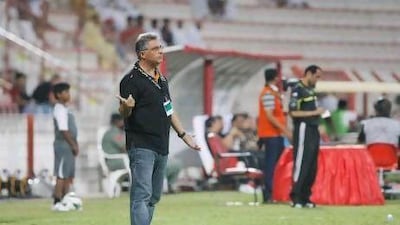The UAE coaching carousel seems to be picking up speed. After four rounds of the Pro League, two coaches have already been shown the door - Dragan Talajic by Kalba and Marcelo Cabo at Dibba Al Fujairah.
Who is next? Paulo Bonamigo could be watching his back after Al Jazira's loss at Al Dhafra on Sunday. The 2010/11 champions have also lost twice at home - to Al Nasr (2-1) in their opening match of the Pro League and Al Wasl (3-2) in the Etisalat Cup. The next game, against Al Ain, could be make or break.
Abdul Wahab Abdul Qadir, the Ajman coach, could be under some pressure as well after just one point from four Pro League matches. But then, he has two wins from two in the Etisalat Cup.
The Al Shabab fans, and players according to some rumours, are unhappy with Marcos Paqueta, and the team who finished third last season have lost three of their four league matches. The Brazilian has, however, just received a vote of confidence from his employers and Sami Al Qamzi, the chairman of Shabab's board of directors, was spot on with his arguments against a change.
Replacing Talajic with Lufti Benzarti has not led to any changes in Kalba's fortunes; they were still humbled 6-1 by Al Nasr and lost to Al Dhafra. Abdullah Misfir's vast experience might not help Dibba much either.
And the failures will not be a reflection of their coaching abilities - they simply do not have enough time to turn things around. As Al Qamzi pointed out, with matches being played every week, the incoming coaches will struggle to implement their strategies.
Failure is also not the responsibility of just one person, as Al Qamzi said, and the players are equally to blame. Club managements with itchy fingers would do well to heed these words.
The Shabab model and philosophy is worth emulating. They have invested in stability, knowing they cannot match the money power of some other clubs. And the policy has brought dividends.
They have a steady stream of young players coming through the ranks, as well. Clubs like Kalba and Dibba might also have good youth systems, but they need to plug the talent drain. As one of Kalba's former stars, Hilal Mohammed, said, they should start by offering contracts to their best youth team players. This will stop them from leaving for the bigger clubs.
It is a long-term plan, but that is what these clubs need. Dismissing managers is not a fix.

